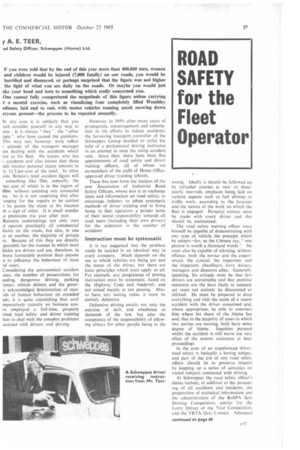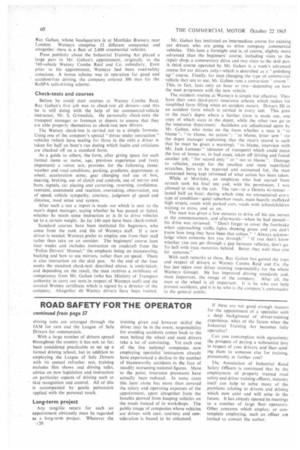ROAD SAFETY for the Fleet Operator
Page 59

Page 62

If you've noticed an error in this article please click here to report it so we can fix it.
r A. E. TEER,
ad Safety Officer, Schweppes (Home) Ltd.
F you were told that by the end of this year more than 400,000 men, women and children would be injured (7,000 fatally) on our roads, you would be horrified and dismayed, or perhaps surprised that the figure was not higher the light of what you see daily on the roads. Or maybe you would just ake your head and turn to something which really concerned you.
One cannot fully comprehend the magnitude of this figure unless carrying t a mental exercise, such as visualizing four completely filled Wembley idioms, laid end to end, with motor vehicles running amok mowing down ery-one present—the process to be repeated annually.
In any case it is unlikely that you mid consider yourself in any way to Line. It is always "they ", the "other ople", who have caused the accidents. This may not. however, truly reflect attitude of the transport manager en dealing with the accidents which cur to his fleet. He knows who has ! accidents and also knows that those Lich involve personal injury amount to ly 1+-2 per cent of the total. In other u-ds. Britain's total accident figure will
something like 20m. annually, the .ect cost of which is in the region of 00m. without counting any concealed sts. So it is not surprising that after .anging for the repairs to be carried t he passes the claim to his insurers th a sigh of relief, It is small wonder it premiums rise year after year.
Business undertakings not only own d operate practically all commercial hicks on the roads, but also, in one ty or another, the majority of private rs. Because of this they are directly tponsible for the manner in which most hides are driven and are, therefore, in more favourable position than anyone e to influence the behaviour of most ad users.
Considering the astronomical accident ures. the number of prosecutions for ceding, dangerous driving, parking 'ences. vehicle defects and the genery acknowledged deterioration of stenrds of human behaviour on crowded ads, it is quite astonishing that until mparatively recently no business conrn employed a full-time, properly tined road safety and driver training jeer to deal with the complex problems Lociated with drivers and driving. However. in 1959; after many years of propaganda, encouragement and exhortation in his efforts to reduce accidents. the far-seeing transport controller of the Schweppes Group decided to enlist the help of a professional driving instructor in an attempt to stem the rising accident rate. Since then, there have been five appointments of road safety and driver training officers, all of whom are ex-members of the staffs of Home Officeapproved driver training schools.
These five now form the nucleus of the new Association of Industrial Road Safety Officers, whose aim is to exchange ideas and information on road safety, to encourage industry to adopt systematic methods of driver training and to bring home to fleet operators a proper sense of their moral responsibility towards all road users (including their own drivers) for the reduction in the number of accidents Instruction must be systematic
It is not suggested that the problem could be tackled in an identical way in every company. Much depends on the use to which vehicles are being put and the status of the driver, but there are basic principles which must apply to all. For example, any programme of driving instruction must be systematic, based on the Highway. Code and roadcraft, and not aimed merely at test passing. Also. to have any lasting value, it must he entirely defensive.
Defensive driving entails not only the exercise of skill and obedience to demands of the law, but also the acceptance of the responsibility of allowing always for other people being in the wrong. Ideally it should be followed up by refresher courses at twoor threeyearly intervals, emphasis being laid on various aspects such as fast driving or traffic work, according to the location and the nature of the work on which the fleet is engaged. Personal contact must be made with every driver and this should be maintained.
The road safety training officer must himself be capable of demonstrating with any type of vehicle the precepts which he adopts—for, as the Chinese say, "one picture is worth a thousand words". He must also be capable of advising, without offence, both the novice and the experienced, the cynical, the important and the impatient, chauffeurs, lorry drivers. managers and directors alike. Generally speaking, his attitude must be that few drivers are untrainable and that punitive measures are the least likely to succeed. yet must not entirely be discounted or shirked. He must be prepared to drop everything and visit the scene of a recent accident with the driver concerned and, where appropriate, be able to convince him where his share of the blame lies and, that in the majority of cases in which two parties are moving, both have some degree of blame. Inquiries pursued whilst the accident is still warm are very often of the utmost assistance at later proceedings.
In the eyes of an experienced driver. road safety is basically a boring subject. and part of the job of any road safety officer should be to preserve interest by keeping up a series of activities on varied subjects connected with driving.
At Schweppes the road safety officer's duties include, in addition to the processing of all accidents and incidents, the preparation of statistical information and the administration of the RoSPA Safe Driving Competition: entries for the Lorry Driver of the Year Competition. and the TRTA Quiz Contest. Advanced driving tests are arranged through the JAM for cars and the League of Safe Drivers for commercials.
With a large number of drivers spread throughout the country it has not, so far, been considered practicable to set up a formal driving school, but in addition to employing the League of Safe Drivers with its annual refresher test, training includes film shows and driving talks, advice on new legislation and instruction on particular aspects of driving such as skid recognition and control. All of this is accompanied by gentle persuasion applied with the personal touch.
Long-term project Any tangible return for such an appointment obviously must he regarded as a long-term project. Whatever the training given and however skilful the driver may be in the event, responsibility for avoiding accidents comes back to the man behind the wheel and most drivers take a lot of convincing. Yet each one of the five national companies now employing specialist instructors already have experienced a decline in the number of blameworthy accidents in the face of steadily worsening national figures. More to the point, insurance premiums have actually been reduced. In some cases this item alone has more than covered the salary and operating expenses of the appointment, apart altogether from the benefits derived from keeping vehicles on the roads instead of in workshops. The public image of companies whose vehicles are driven with care, courtesy and consideration is bound to be enhanced. If these are not good enough reasons for the appointment of a specialist with a deep background of driver-training experience, what of the future when the Industrial Training Act becomes fully operative?
Can you contemplate with equanimity the prospect of paying a substantial levy in respect of your drivers, and then sending them to someone else for training, presumably at further cost?
The Association of Industrial Road Safety Officers is convinced that by the employment of properly trained road safety and driver training officers, industry itself can help to solve many of the problems relating to drivers and driving which now exist and will arise in the future. It has already opened its meetings to a number of large fleet operators. Other , concerns which employ, or contemplate employing, such an officer are invited to contact the author.
















































































































